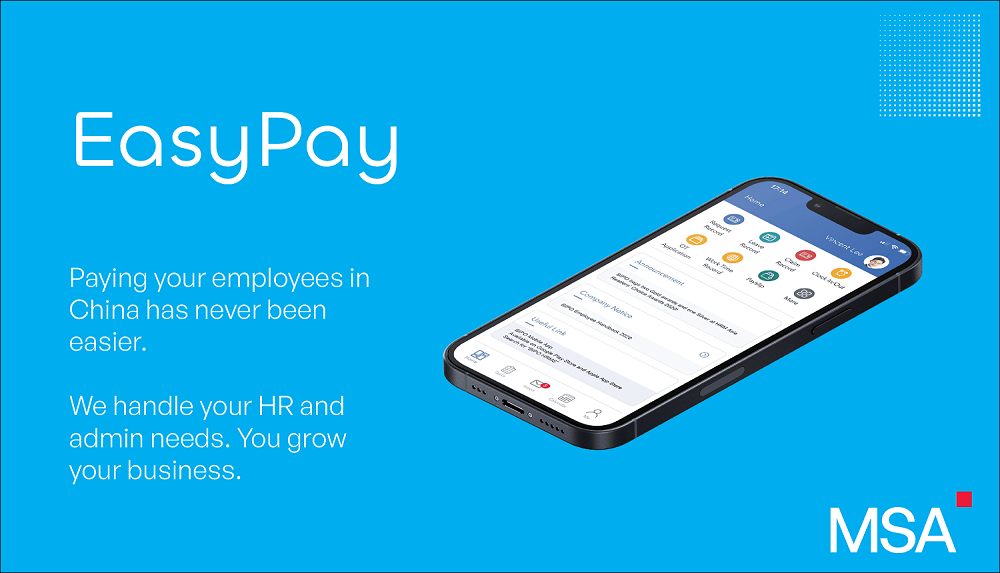China is one of the most sought-after countries for foreign investment because of its enticing policies, competitive labor rates, and market reach. For foreign employers, hiring both local and foreign employees ensures the right combination of competence and diversity.
Before foreign businesses can employ expatriates, they need to go through a lengthy process and provide extensive documentation in accordance with the labor laws of China. This article will outline the essential requirements for how to hire foreign employees and start or expand your business in China.
Eligibility Requirements for Foreign Employees
Foreign employees are employees who are not born as Chinese citizens or have not obtained permanent resident status in China.
If you wish to hire foreign employees in China, you have to implement the following requirements for eligibility:
- Should be over 18 years of age
- Should have professional skills and related work experience
- Must not have any criminal record
- Should be employed by a specific employer
- Should hold a valid passport as well as any related documentation required for international travel
Essential Documents Employees Need to Submit
Before employers can get a work permit, an employee must submit the following documents:
- A scanned copy of the passport information page
- A recent, passport-size photo
- Medical examination report from an authorized hospital
- A reference letter
- Non-criminal record (background check) translated and authenticated by the Chinese Embassy/Consulate
- Bachelor’s degree or above which has been translated and authenticated by the Chinese Embassy/Consulate
- For those applying for teaching positions, a TEFL/TESOL certificate which has been translated & authenticated by the Chinese Embassy/Consulate
How to Obtain a Work Visa for Foreign Employees in China
Hiring a foreign employee involves a lot of processes and documentation. In China, obtaining a work visa is mainly handled by the employer. You need to bear in mind the following steps in the correct order to obtain the work visa and avoid legal faults:
- Employers should get an employment license from the local authorities.
- The employer should secure a work visa from the foreign affairs office.
- The employee uses the work visa obtained by their employer to apply for the position while they are still in their home country.
- The employee travels to China and must obtain an alien employment permit. The permit can be acquired from the local labor authorities.
- The employee must apply for an alien residence permit. This permit can be obtained from the local public security department.
To discover more about visas in China, check out our Complete Guide to Doing Business in China.

Doing Business in China
If you want to learn more about Doing Business in China, you’ve come to...
Read moreAs an employer, you should take note that the work and residence permits must be periodically renewed if you plan to continue employing a foreign worker.
Establishing a Labor Contract
Before foreign employees can work for an organization in China, they have to sign a labor contract with their respective employers. Five years is the maximum duration of a labor contract, although this can be renewed as prescribed in the labor laws of China.
When writing a labor contract, take note of this general guideline on what to include:
- Date of signing
- Job title, description, and location
- Term of contract
- Probation period
- Working conditions
- Labor protection
- Salary, benefits, and insurance contributions
- Termination conditions
- Disciplinary rules
- Provisions for breach of contract
- Other provisions like non-disclosure or non-compete agreement
A labor contract is a legally binding document, so it is best to have it drafted by a professional to ensure regulatory compliance while minimizing the risk of potential challenges.
Work and Residence Permit
There are three types of work permit in China:
- Class A – Elite and highly qualified talents
Foreign employees with a salary 6 times more than the average salary in the city they’re applying to are usually classified under this category. Qualified individuals enjoy a faster and paperless verification process that will take only around 1 month to complete.
- Class B – Professional talents
Candidates with a bachelor’s degree and more than 2 years of work experience generally fall under this classification. Applicants under this category need to submit additional documents, including certificates of academic qualifications and proof of no criminal record.
- Class C – Miscellaneous talents
Fresh graduates and applicants with no undergraduate degree are categorized as Class C talents. Type C work permits are often subject to quota management, which means only a limited number of applicants can get them on an annual basis.
The classification is based on the eligibility of expatriates using a comprehensive evaluation system that includes point-based scoring, labor market test, and quota administration.
Points are based on the applicant’s educational background, work experience, salary level, age, achievements, and Chinese language proficiency. Those who plan to work in less developed areas in China are more favored by the government.
Foreign employees with an approved Work Permit are then required to apply for a Residence Permit within 30 days of their entry into the country. Obtaining a Residence Permit means all the documents and procedures for hiring a foreign employee have been completed. The validity period of the Residence Permit is the same as the Work Permit.
Individual Income Tax for Foreign Employees, Social Security, and Other Contributions
The taxation laws in China can be particularly challenging to navigate. Hiring a tax law specialist is highly recommended to ensure compliance with national and local regulations.
When hiring foreign employees, you need to learn about the Chinese Individual Income Tax (IIT) Qualification. This policy categorizes employees into 4 different categories depending on their tenure in the country:
- Category 1 – Working for less than 90 days
Foreign employees who have worked, either cumulatively or continuously, for less than 90 days in the country will only be taxed on China-sourced income. The income earned from foreign companies is exempted under the standard double-taxation agreement with China.
- Category 2 – Working for more than 90 days but less than a year
Income earned by foreign employees, both from Chinese and foreign companies, will be taxed depending on whether the individual is domiciled in China. Non-domiciled individuals will be taxed on their China sourced income, irrespective of whether their income is carried or paid by an enterprise or PRC individual. Domiciled individuals are taxed on their worldwide income.
- Category 3 – Working for more than 1 year but less than 6 years
All China-sourced income will be subject to IIT. Employees who have resided in China for more than 1 year, but less than 6 years, will be subject to IIT in China. An exception to this is if the employee is employed by a foreign company and that employee proceeds to take a leave of absence from China temporaril, any income they earn from abroad will not be taxable in China.
- Category 4 – Working for more than 6 years consecutively
A foreign employee will be taxed on their worldwide income if their length of stay in China has exceeded 6 years and if they have not left the country for more than 30 days in a fiscal year.
The IIT system in China works on a progressive system which is based on an employee’s wage bracket and ranged from 3% to 45%.Foreign employees in China enjoy a standard deduction of RMB 5,000 per month on the tax they have to pay aside from other allowances that they can file for further deductions.
In China, the Social Security System is divided into two parts: social insurance and the housing fund (for more details on the Social Security System, check out the Complete Guide to Doing Business in China)
Social insurance is composed of funds for pension, work injury, medical, unemployment, and maternity. Contributions for pension, unemployment, and medical are required from both employees and employers. Funds for work injury and maternity, on the other hand, solely come from employer contributions.
Contributions to the housing fund are divided equally between employees and employers and can range from 5% to 25% of the employee’s income. However, contributions to the housing fund are only optional for private companies. For employers, this can be used to entice and incentivize foreign employees to work in China.
The Components of Expat Salary Packages
Employers should present an enticing salary package to attract foreign employees to work in China. The package usually consists of the base salary, social insurance, allowances, and bonuses. Also, the company typically pays for the visa processing and application-related expenses of the employee.
Chinese laws enforce a 30% to 35% threshold when it comes to how much a typical salary package can be composed of allowances (which is tax deductible). In addition to the annual salary, foreign employers can offer allowances like daily meals, tuition fees, business travel expenses, housing costs, relocation costs, and airfare. The contract between a foreign employee and employer should have a complete breakdown of all the allowances included in the compensation package.
Drafting the salary compensation can be process-intensive, which is why it is strongly advised to have it handled by a professional. This also ensures compliance with local and national regulations.
Challenges Foreign Employees May Face in China
Language Barrier
Possibly the biggest hurdle is language. Chinese may be difficult to learn for foreign employees and not all locals speak English. Still, there are many who can speak English, especially in major cities like Beijing and Shanghai.
Administrative processes like setting up a bank account and the visa process can be challenging for individuals who do not understand the language and will require assistance with these processes.
Cultural Differences
When it comes to beliefs, foreigners will notice that the locals may have a different view of their functions in society. Adapting to a different level of transparency regarding roles and responsibilities in the workplace and acting in accordance with local business etiquette can be demanding to navigate.
The concept of guanxi, which refers to making strong personal connections with other people, is important in China. For instance, even if there is a qualified candidate for a job, a family member of a high-ranking official in the organization will be prioritized over the candidate for the open position.
How MSA Can Help
When it comes to establishing and connecting your business in China, MSA can help make the process easier and hassle-free. MSA is an accounting and financial advisory firm that supports foreign enterprises in the country by helping them in handling tax, accounting, finance, ERP, CFO, and HR and payroll services. We specialize in helping SMEs and multinationals establish their business in China by providing a full range of transparent and compliant services.
Contact us today if you need help in managing the hiring, payroll, tax, social security, mobility, immigration and visa, and PEO employment dispatch services.





